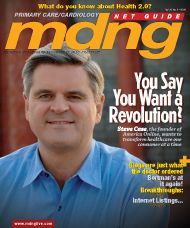Publication
Article
MDNG Primary Care
Got Something to Say? Start a Blog!
So you think you can dance... I mean, blog? Physicians who have something to say are increasingly turning to blogging to express themselves, as they find it an efficient way to communicate their passions.
So you think you can dance... I mean, blog? Physicians who have something to say are increasingly turning to blogging to express themselves, as they find it an efficient way to communicate their passions. The best way to think about blogging is to look at it as simply the act of writing—opinions, editorials, reviews, clinical discussions, and even personal diary writings—except that it’s online, not in an old-fashioned journal. In my opinion, there are two very different species of physician bloggers: one prefers a private community, whereas members of the other one love to express themselves to the public.
Those who write in private communities do so for many different reasons. Many participate in social networks such as Facebook to keep up with friends by writing “updates,” or posting their resumé and other information in LinkedIn to share professional relationships. Others may feel safe enough to discuss medical care issues, believing that they’re protected from malpractice risk by the privacy protections offered to them by services such as Sermo. Although this venue has become somewhat popular, my concern is that an unusual case can easily be pinpointed to a specifi c individual by as few as three unique facts. Those who write publicly do so in many diff erent venues. I’d argue that those physicians who answer readers’ questions for their local paper’s website are blogging, especially if their readers have the opportunity to post comments. The traditional picture of a blogger is that of a writer who shares his or her personal opinions on a website that is individually identifi ed with the writer and not representing a medical practice or a larger organization. They write about matters of current interest and often in response to a local or national issue. For ease of use, these are most often hosted at a service provider such as Google’s Blogger or Six Apart’s TypePad, but can be hosted from the writer’s own URL using WordPress or other open source software designed for techy bloggers.
No matter the format, good blogging requires individual expression. Th e level of trust readers place in a blog is often directly related to the writer’s pride in his or her writing. In my opinion, there is no place for marketing gloss and PR pizzazz in blogging; that way readers feel as if they’re getting the honest story. Many public bloggers often refrain from discussing specifi c medical cases to limit their malpractice risk. To increase their readership, many physician bloggers contribute to Grand Rounds, the weekly roundup of the medical blogging community’s best posts (http:// blogborygmi.blogspot.com/2004/09/grandrounds-archive-upcoming-schedule.html). One way that some physicians who blog publicly choose to limit their risk when writing about medicine online is to write for a website that covers their liability for providing this patient education. As long as the writing discusses conditions and treatments in general terms, using hypothetical medical cases, it can be considered patient education. Universities, large medical groups, and other organizations have adopted this approach. Some private websites also offer this liability coverage.
The key when deciding whether to start a blog is to outline your goals—what do you hope to get out of it? Blogs can provide physicians with a great deal of personal satisfaction (especially when readers respond favorably to their opinions), as well as support their professional goals (eg, increasing referrals or seeing a particular subset of patients, either in private practice or for academic research study recruitment). If you have a desire to write, my advice is simple: get to it! Your readers will respond to what they like most and help you develop as a writer.
To help you get started, attend the MDNG webinar “Is Your Voice Being Heard? Top 20 Blogging Tips” that I will be hosting on June 26 at 8:30pm EST. Sign up at www.mdnglive.com/webinars.
Enoch Choi, MD, of PAMF Urgent Care & Stanford Univ. has been blogging on medicine, technology, parenting, and wine for five years and writes in all of the venues he’s mentioned in the article. He has transitioned from amateur to employed by PAMF and MedHelp as a blogger. Although a frequent national speaker on MD blogging, he remains an amateur karaoke warbler. He can be found online at www.medhelp.org/user_posts/list/242516. He’s excited to be the most recent addition to the MDNG editorial board, having contributed several articles to the publication over the years.






